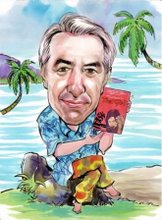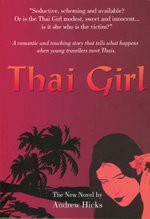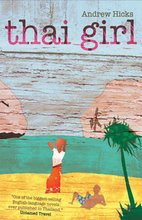

For the Thais personal appearance is everything. They judge all foreigners by how we look, by our dress, our cleanliness, our manners. And they’re crazy about good looks too. Looking good’s really important to the Thais.
Thus, although Thailand isn’t the richest of places, it has the most developed cosmetic surgery industry anywhere in the world. All the glossy magazines are full of ads showing ‘before and after’ buttocks and boobs and many a sweet little turned up nose get’s remodelled as a bird-like beak because they don’t like their noses too flat, too ‘Lao’. Yes, they always go for the Euro-look in everything and eyelid tucks making the eyes less oriental are always popular.
Images of European faces are used everywhere in consumer advertising, unattainable images even for a European, and a high proportion of Thai soap stars, both male and female are of mixed parentage. That way the starlet gets the desirable looks of a foreigner without actually being one.
The biggest no-no is dark skin, a phobia which amounts almost to an apartheid. If there are two pretty sisters, one who’s pale skinned, the other dark, their lives will most likely follow different paths. The light skinned one is worth educating as she can go on to work as a hotel receptionist, in a smart department store, in a bank. The other will struggle at the bottom end as she looks too like a peasant farmer. Many better jobs will not be open to her and she’ll end up in the sweat shops making shoes, cooking food in the street, cutting up chicken in an ice cold factory. Her only way up could be to work in the bars of the tourist places where the farang drink as the farang seem to like these ‘ugly’ women.
The Thais always demand white skin and when it comes to image, they also like girls, not women. They adore the cuddly, the quaint, the cute plaything. They love soft toys, kids dressed to kill, fluffy toy dogs and fluffy toy females, undemanding, sweet and disposable.
You’ll see these girls in the TV soaps, impossibly pretty but equally obnoxious. You’ll see them dancing in frothy pink dresses on stage in every TV show and at every festival throughout the country. Though the music’s wild and the dancing suggestive, they’ll be there at every big wedding, at commercial promotions and even at village temples and in schools. The school kids are made up like adult dolls and gyrate and grind suggestively. It’s surprising that sexy dancing and aerobics seem to be on the national curriculum but then the rules are written by the men. Sadly Thai classical dancing has gone backstage and dancing girls are now as universal as som tam and cola.
Thailand has a clear and unbending gender hierarchy too with men on top and the women beneath, followed in third place by a huge multitude of gender benders. Thai ladyboys are tolerated as a diverting laughing stock and with this duty to entertain, they’re always out there dancing with the best of them.
While Cat and I have been in Bangkok our old friend, Peter arrived from Si Saket, so he and I got together for a drink at his hotel in Saphan Kwai. It’s a smart modern tower block with international standard hotel rooms and a dark restaurant in the subterranean style the Thais often seem to like. In the daytime it’s about as welcoming as the grave so Peter and I went and sat outside on hard seats made from dismembered ox carts, the traffic flowing past us as we emptied a bottle or three.
As expats do, we expatiated at length, catching up on what each has been doing in our parallel lives. Peter tells me he’s selling up in England without regrets, happily disposing of all the accumulated possessions of a lifetime. I say I’m more reluctant to let go of the trappings of my past life which then leads us into Buddhism which Peter’s been reading about recently.
It seems to be a very un-western philosophy, that everything in life is illusory, impermanent, unsatisfactory. Desire is the cause of human suffering and only if you renounce all worldly things, thus denying the self, can you achieve enlightenment.
What about my human rights, I ask Peter, my individuality, my own self-determination? But it’s all too serious as the alcohol’s slowing my brain and I switch off and bow to Bacchus. We westerners always get it wrong it seems. ‘I think too much, therefore am not.’
Talking of desire, Peter tells me that displayed in the hotel lobby are some photos of a troupe of ladies both wearing and not wearing flouncey pink dresses. I go to have a look and yes, they’re giving a cabaret later that night. As Peter and I are curious and have yet to renounce the world, we’re quite tempted to stay up after bed time and wait for the show.
We eat in the restaurant, stabbing forks blindly in the dark as they’ve turned off the lights, a successful policy to drive away dinner guests. The other disincentive to disturbing the cooks is that as well as not being able to see, we can’t hear anything either. On an elaborate stage at one end of the room the hotel’s ‘professional’ karaoke singers are singing dreary, repetitive songs with the volume turned up, thus precluding any further discussion of Buddhism.
The female singers are faded mutton in frilly nighties, white legs nipped by the air conditioning, the men sulky and serious in oversize suits from the sixties. Who’s listening anyway and it annoys me that they’re far, far too loud.
It seemed a very long wait but at the witching hour the dance troupe appears and bursts onto the stage in an explosion of sound and light. There are eight of them, stunning looking girls in frothy frocks, all long of limb and lash, resplendent in lip gloss and spectacular uplift.
And did they perform! It’s the show of their lives even though they outnumber the audience, and the singer, in Peter’s view, is one of the best he’d heard in Thailand.
The next act features much skimpier dresses, then followed by something completely different, a single singer, a grotesque. The girl’s as ugly as the others were sparkling. She’s in tight jeans cut short and a black bra and she looks four months pregnant, her hair in little-girl bunches, her face made up like a clown. I begin to wonder, but you can always tell a ladyboy by the voice and this girl is trilling like a teenager. Meanwhile the Thai waiters are laughing uncontrollably.
Now she’s camping it up and, gripping the cordless microphone she’s prancing off the stage still singing. Heaven forbid, she’s coming towards us! My heat misses a beat but thankfully she stops at another table and, throwing herself into the lap of a cartoon fat farang , wraps her arms around him and plants passionate kisses on his pudgy face. All the time her singing continues which is surprising as, like a ventiloquist, her lips aren’t moving and she’s glued to the man’s face.
Then there’s another dance by all the ladies, followed by a second gargoyle. And now I think I’m just beginning to get the picture.
When the troupe comes on again, it looks like the budget doesn’t stretch to any more costumes and they’re in bikinis, though some of them couldn’t afford the tops. I always thought Thai ladies were a bit short in the upstairs department but if these girls are typical, then I’ve got it very wrong. At least they’re slim hipped, though a couple are a bit hefty in the shoulders.
Now they’re all leaving the stage but the singing never stops. Yes, they’re coming round the tables and having their photos taken with the fans. I’m getting nervous again, especially when one of them leans close to my ear, puts her hand on my thigh and whispers in a surprisingly deep voice, ‘Tip, tip. Give me tip’.
It was thus an amazing evening, the ladies, the singing, the mammaries, all an illusion, a fantasy, mere fleeting images. So very Thailand!
Now suddenly they’re packing up and they’re gone, rushing on to galvanise the next sleepy hotel on their long schedule that night. Briefly there’s silence in the dark restaurant before the next tedious karaoke singer takes to the stage again and starts moaning interminably into the microphone.
I reflect that I’m lucky to have my own life and reality, even if sometimes life is a cabaret, a comedy even. For others like tonight’s dancers the illusion, the fantasy, the images are all too real. They’re at the bottom of the heap and for them cabaret is a life. Perhaps it's the best that society allows them.




























